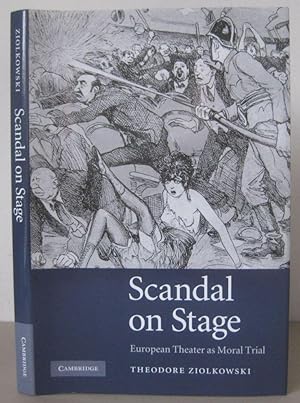New plays and operas have often tried to upset the status quo or disturb the assumptions of theatre audiences. Yet, as this study explores, the reactions of the .
Table of contents
- Formats and Editions of Scandal on stage : European theater as moral trial [leondumoulin.nl]
- Join Kobo & start eReading today
WorldCat is the world's largest library catalog, helping you find library materials online. Don't have an account?
Formats and Editions of Scandal on stage : European theater as moral trial [leondumoulin.nl]
Your Web browser is not enabled for JavaScript. Some features of WorldCat will not be available. Create lists, bibliographies and reviews: Search WorldCat Find items in libraries near you.
- The Phoenix Pick Anthology of Classic Science Fiction.
- Ancient Wisdom, Modern World: Ethics for the New Millennium.
- Morning Glory - a daily devotional.
- Scandal on Stage: European Theater as Moral Trial by Theodore Comp Ziolkowski (E | eBay?
- ;
Advanced Search Find a Library. Showing all editions for 'Scandal on stage: European theater as moral trial' Sort by: Refine Your Search Year.
- .
- Inspire Your Career: Strategies for Success in your First Years at Work.
- Additional Information.
- Vasudhs Kitchen: Indian Cooking Simplified.
- The Beautiful Festival of the Valley.
Select All Clear All Save to: Your list has reached the maximum number of items. Brechtje Beuker Scandal on Stage: European Theater as Moral Trial. Cambridge University Press, As a communal medium, theater exceeds any other art form in its ability to function as a testing ground for sociopolitical, ethical, and aesthetic norms.
In doing so, it aims to shed light on a question with which drama theorists have long concerned themselves: Without exception, the playwrights and composers under investigation have been well researched, and rather than adding further work analyses Ziolkowski draws on existing scholarship in order to discern the main aspects that underlie theatrical [End Page ] scandals across genre and time.
As the author himself points out, his approach is that of a literary and cultural historian, not a theater scholar. Indeed, readers familiar with theoretical models from the field of theater studies will likely regret that the book does not engage more with contemporary ideas on performative aesthetics, or with the studies on audience sociology and reception theory referenced in the preface.

Nevertheless, they will find the book useful as a source of fascinating case studies from which one can easily delve into broader theoretical reflections. The collective disapproval typical of scandal presupposes the existence of shared opinions and values, and it was only with the ascendency of the middle class that a public consciousness emerged. While a bourgeois audience adopted the theater as a site of self-representation, artists—liberated from the constraints of court and church authorities—embraced their newfound freedom to express or challenge the views and sentiments of their spectators.
Join Kobo & start eReading today
By contesting both the sociopolitical and the aesthetic order, Schiller successfully transformed the theater into a forum for moral and ethical debate. Instead, bourgeois and bohemian spectators clashed over formal innovations that marked the transition from a neoclassical to a romanticist style. Consequently, Ziolowski argues, Hugo failed in his attempt to use the stage as a moral institution.